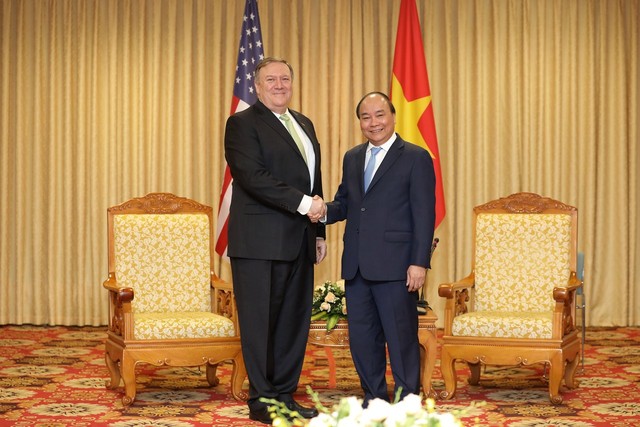 |
|
Secretary of State Mike Pompeo shakes hands with Vietnamese Prime Minister Nguyen Xuan Phuc at the International Convention Centre in Hanoi on July 9. Pompeo flew to Vietnam after his high-level talks North Korean officials in Pyongyang on July 6-7 and a trilateral foreign minister meeting in Tokyo on July 8. (Reuters)
|
Kim Jong-un needs sanctions lifted to fulfill promises of rebuilding economy
“If I paid attention to the press, I’d go nuts.” So said US Secretary of State Mike Pompeo at a press conference following a trilateral foreign ministers’ meeting with South Korea and Japan on July 8. Pompeo also said, “We know critics will try to minimize the work that we have achieved.” For that reason, he said, he tries not to pay them any mind. Ironically, it was an admission of his acute sensitivity to public opinion. Since beginning negotiations with Pyongyang, the US administration has been hampered by critical opinion, led by mainstream media and expert groups hostile to President Donald Trump. After facing accusations of “falling into Kim Jong-un’s trap” following the June 12 North Korea-US summit, the Trump administration looks to have gone “all in” on the denuclearization agenda with Pompeo’s third visit to North Korea. It has also started trotting back out rhetoric about “maximum pressure,” which it had avoided for a month or so – and which Pyongyang is extremely perturbed by. It has offered no additional “gifts” related to improving bilateral relations or building a peace regime, apart from a halt in joint military exercises with the South and other “goodwill measures” ahead of Pompeo’s visit. This explains the North’s characterization of the US as “apprehensive” in a recent Foreign Ministry spokesperson’s statement. Viewed simply in terms of the “objective” scheme of things, Kim Jong-un is in a position of greater urgency; Trump has a relatively freer hand. As is well known, Trump would like to position progress on North Korea’s denuclearization as a stepping stone on the path to victory for the Republicans in the November midterm elections and the 2020 presidential election. This means his “deadline” is effectively under November. Kim Jong-un needs to implement denuclearization to fulfill his public promise Kim, in contrast, needs visible results in the economic sector after an Apr. 20 plenary session of the Workers’ Party Central Committee where he effectively declared an end to Pyongyang’s “two-track” approach of economic and nuclear development and adopted a new strategy of “focusing all capacities on building the socialist economy.” If he hopes to “celebrate the 70th anniversary of the founding of the Republic [on Sept. 9] as a great festival,” as a July 3 editorial in the Rodong Sinmun newspaper put it, he will first need sanctions relaxed so that he can “complete the Wonsan-Kalma coastal tourism zone at the highest level” (according to a front-page story in the Rodong Sinmun’s June 5 edition) by the Day of the Sun holiday (the anniversary of Kim Il-sung’s birthday) on Apr. 15, 2019, and begin bringing in foreign currency from tourists. “The Wonsan-Kalma coastal tourism zone effort, which is a ‘state project’ for the Kim Jong-un regime, won’t be good for anything unless the sanctions on North Korea are relaxed,” said a former senior official. For Kim, the continuation of sanctions into the long term would be a disaster. From his position, he needs to implement denuclearization measures swiftly to have the sanctions lifted. But the same former official also noted, “While Kim may be the one who is pressed in objective terms, it’s worrying to consider what negative effect it may have on North Korea-US negotiations from this paradoxical situation where Trump is being driven into a position of greater urgency by public opinion.” Indeed, the outcome of Pompeo’s recent third North Korea visit suggests the concerns are not unfounded. A South Korean expert who recently visited the US explained, “It’s a bizarre situation where all the US experts are critical of President Trump’s North Korea policy, while the ones visiting from South Korea are supporting it.” “This could be a dangerous situation if it keeps up,” the expert remarked. Indeed, there is a risk that Washington’s “apprehension” may be taken as unilateral pressure by Pyongyang, which may “slow its roll” with denuclearization in response – further intensifying apprehensions in the US. Many are saying the situation urgently demands a judicious approach to head off further misunderstandings and sustain or build momentum in the positive feedback loop that made possible a historic first North Korea-US summit. As an example, they are suggesting the US show its good faith in early measures to improve relations and building a peace regime, which would allow Kim to pursue more proactive denuclearization measures, while North Korea offers “cooperation” that would allow Trump to do some boasting on Twitter. In other words, it’s a call for “exchanging good will gestures.” As one South Korean government official put it, it’s a momentum that calls for “lubrication” to avoid North Korea-US negotiations ending up deadlocked. By Lee Je-hun, senior staff writer Please direct comments or questions to [english@hani.co.kr]






